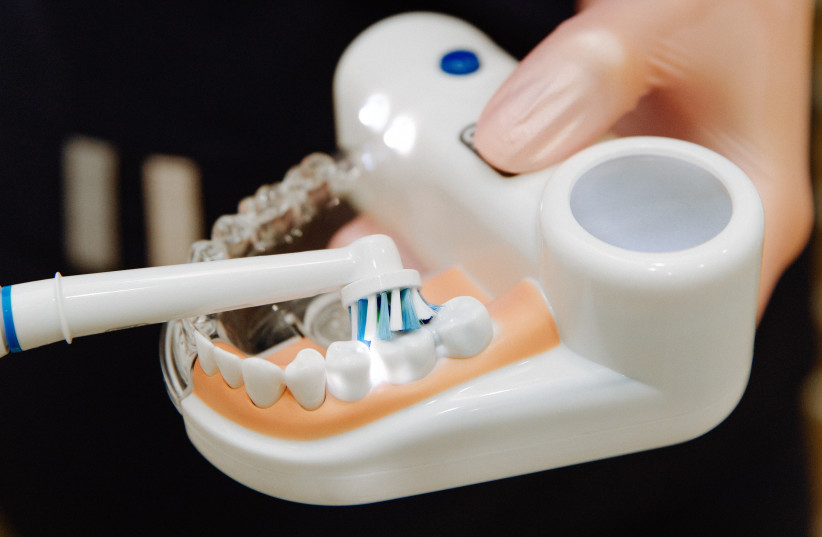Does brushing your child's teeth twice a day really protect their gums?

For about the last decade, Israeli drinking water in Israel hasn't had fluoride. Yet, most pastes on the market don't contain enough fluoride. So, what can you do to protect kids' teeth?
Fluoride contributes significantly to maintaining dental health. Today, though, our kids don't receive fluoride from tap water.
Despite updated recommendations from the Health Ministry, most kids' toothpaste doesn't contain enough fluoride to protect teeth.
If we want our kids to have healthy teeth and fewer or no cavities, it's not enough that we make sure they brush their teeth twice a day and prevent them from eating too many products which harm teeth. We must also make sure that the toothpaste gives sufficient protection.
So, what's fluoride and why is it important to pay attention to the issue to protect our kids' teeth?
Fluoride, the negative ion of the element fluorine, affects the health of the teeth in several ways: it prevents mineral build-up on the enamel, the outer and strongest layer of the tooth; encourages the development of minerals that strengthen the enamel; and blocks bacteria that excrete acid and damage teeth.
Until the early 1980s, more than 90% of all Israeli children suffered from dental problems, and tooth decay was a very common problem among children. Since 1981, the year in which the drinking water fluoridation project began, the condition of Israeli children's teeth has been improving.
When fluoride is absorbed into the body systemically through drinking water, it strengthens the enamel of the teeth from the stages of their development and before they erupt into the oral cavity. Also, later when it's secreted in saliva and maintains sufficient levels of fluoride in the mouth, this continues to protect the teeth.
Yet although the fluoridation of drinking water is considered one of the greatest successes of the public health field in the 20th century, in 2013 then-health minister Yael German stopped the fluoridation of water, and since 2014 until today, Israeli drinking water doesn't contain the fluoride required to maintain dental health, and the results are continuous damage to the condition of children's teeth.
Increased tooth decay in children
A study carried out by the Maccabident research unit examined the incidence of tooth decay in children between 2014 and 2019. The study indicated that the cessation of fluoridation of drinking water in Israel resulted in a very significant increase in dental problems in children.
The study, published this year in the medical journal Israel Journal of Health Policy Research also confirms findings that emerged in previous studies on the importance of fluoridation, and that the damage to the condition of children's teeth increases the lower the socio-economic status of their family.
More damage to enamel equals more cavities which leads to more treatment with higher costs to families and to the state which covers dental treatment for kids until age 18. The recommendations have been changed but the fluoride has still not been reintroduced into the water system.
Due to the ongoing damage to the health of children's teeth, in June 2022, the Health Ministry published updated recommendations regarding toothpaste for children, which were adapted to the latest international recommendations.
The concentration of fluoride in toothpaste is measured by an index that examines the number of particles per million (PPM - an accepted index for measuring the concentration of substances). Studies show that a fluoride concentration below PPM 1000 in toothpaste is too low to keep teeth healthy.
How should you brush your child's teeth?
According to the updated recommendations, children's teeth should be brushed from the moment the first tooth comes out with toothpaste with a fluoride concentration of 1000 PPM.
Up to age two, a small amount of paste the size of a grain of rice should be put on the brush, and from the age of two to six the paste should be the size of a pea. Above the age of six, the recommendations are to switch to a toothpaste with a fluoride concentration of PPM 1400-1500.
The problem is that, despite guidelines, companies that make children's toothpaste haven't changed the concentration of fluoride to match the new conditions. As of today, some toothpaste for kids don't contain fluoride at all.
In many kinds of toothpaste for kids between the ages of two and six that are sold today, concentrations of fluoride in many pastes range from PPM 500-600. Only in several kinds of toothpaste can you find fluoride concentrations that approach the required concentration according to the updated recommendations to make up for the lack of fluoride in the drinking water in Israel.
Until fluoride is returned to the drinking water, parents are the only ones who can act to protect children's teeth. Brush teeth twice a day and check the fluoride concentration in the paste you buy to make sure it contains 1000 units per million of fluoride, as recommended.
Dr. Jonathan Mann is the director of medical research, Maccabident and the Department of Community Dentistry.
Jerusalem Post Store
`; document.getElementById("linkPremium").innerHTML = cont; var divWithLink = document.getElementById("premium-link"); if (divWithLink !== null && divWithLink !== 'undefined') { divWithLink.style.border = "solid 1px #cb0f3e"; divWithLink.style.textAlign = "center"; divWithLink.style.marginBottom = "15px"; divWithLink.style.marginTop = "15px"; divWithLink.style.width = "100%"; divWithLink.style.backgroundColor = "#122952"; divWithLink.style.color = "#ffffff"; divWithLink.style.lineHeight = "1.5"; } } (function (v, i) { });

